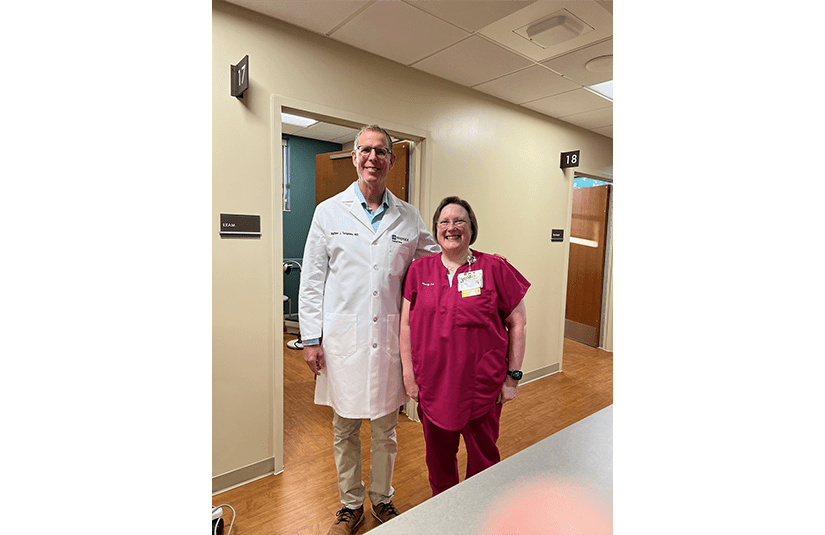Many women assume that incontinence and other pelvic floor disorders are a normal part of aging. They also believe that nothing can be done to ease the pain, embarrassment and isolation they feel.
Neither is true.
Thankfully, local patients now can turn to Matthew Tompkins, M.D., FACOG, URPS, a board-certified specialist in Urogynecology and Reconstructive Pelvic Surgery. Dr. Tompkins joined Riverside Medical Group (RMG) this fall to lead the new Riverside Urogynecology Specialists practice, filling an important gap in women’s health care services
“These conditions are common, but they are not inevitable or untreatable,” he says. “In fact, we usually can make a dramatic impact on a patient’s quality of life with a very simple and safe procedure. I hear all the time, ‘I just wish I’d asked for help sooner.’”
Riverside Urogynecology Specialists was created to offer comprehensive, compassionate care for local patients with pelvic floor disorders, including advanced diagnostic testing, a variety of conservative treatments and, if necessary, surgery. Dr. Tompkins also collaborates closely with Riverside’s pelvic floor physical therapists.
Dr. Tompkins came to Hampton Roads from Lynchburg, Va., where he cofounded the city’s first pelvic floor program in 2006. By the time he left, the practice was bustling and he was performing more than 250 surgical procedures a year. Now seeing patients at Riverside Urogynecology Specialists in Williamsburg, Dr. Tompkins will have a second practice location on the campus of Riverside Regional Medical Center that should open by early 2025.
“We’re so excited to have Dr. Tompkins here,” says Julianne Rowe, Practice Director for the Women’s Service Line at Riverside Health. “We had been working for several years to recruit a specialist with his level of experience and expertise. He also will help our general OB-GYNs by giving them a place to send their patients for specialized care.”
RMG likely will aim to hire an advanced practice provider in the future to support Dr. Tompkins’ work, Rowe adds. “We want him to be able to see new patients in a timely manner so they don’t have to wait any longer than necessary to get relief.”
Pelvic floor disorders occur when the muscles that support and help control the bladder, uterus, vagina and rectum become weak or damaged. Each of those organs also can drop out of position (prolapse) and create a bulge in the vagina or anus.
Common symptoms include urinary leakage, often while exercising, laughing or coughing; pelvic pressure or pain; urinary frequency, urgency or difficulty emptying the bladder; recurring urinary tract infections; fecal incontinence or constipation; and pain during sexual intercourse.
Pelvic floor disorders can affect women in different stages of life, although the risk increases during pregnancy, after childbirth, during perimenopause and after menopause.
Urogynecologists such as Dr. Tompkins can pinpoint problems with detailed diagnostic tests such as a cystoscopy, a visual examination of the inside of the bladder and urethra, and urodynamic testing, which measures how well the urinary tract stores and releases urine.
Based on those results and a patient’s symptoms, urogynecologists create individualized treatment plans that often begin with conservative treatments such as behavioral modifications, physical therapy, inserting a pessary (a device to support a prolapsed organ), biofeedback and electrical stimulation to strengthen pelvic muscles.
Medications also are available for different conditions and tend to have very few side effects. And surgical options are largely minimally invasive and done on an outpatient basis, performed robotically and/or performed through the vaginal opening.
Treatment for pelvic floor disorders is often highly effective. For example, a sling procedure for stress incontinence – an approximately 30-minute surgery to place a mesh strip that supports the neck of the bladder – has an 85% success rate.
Another possibility for patients with incontinence is sacral neuromodulation, in which a small, battery-powered implant sends electrical impulses to nerves that control the bladder and bowel. The devices, similar to a heart pacemaker, are rechargeable and can last up to 20 years.
Additionally, Botox injections can help reduce urinary frequency by partially paralyzing the bladder, usually for a period of about six to 10 months.
For Dr. Tompkins, solving distressing problems for patients is highly rewarding. After earning his medical degree at The Ohio State University, he completed his OB-GYN residency at the University of Virginia, where he was elected Chief Resident. In Lynchburg, he initiated a free gynecology clinic for underserved patients outside his practice.
“I want patients to know that there’s so much we can do for them,” he says. “No one should suffer in silence.”
For more information, visit riversideonline.com/medical-services/womens-health/urogynecology or call 757-782-6450.
